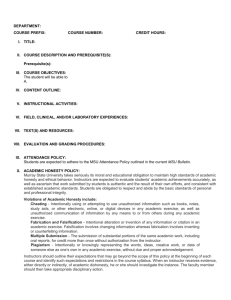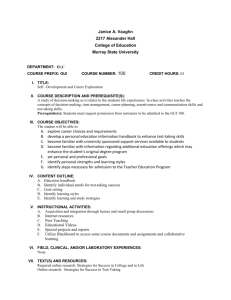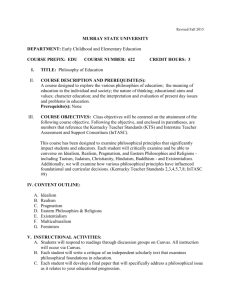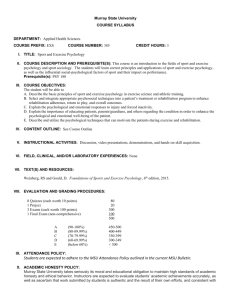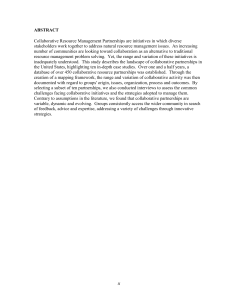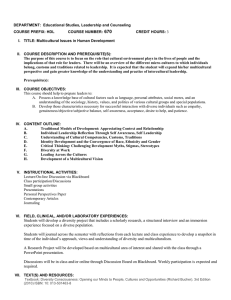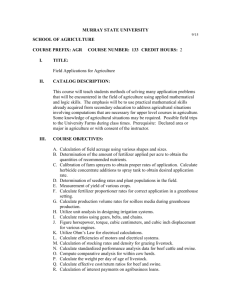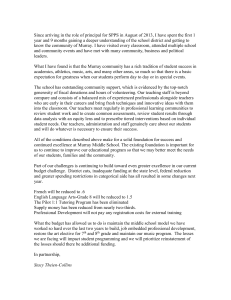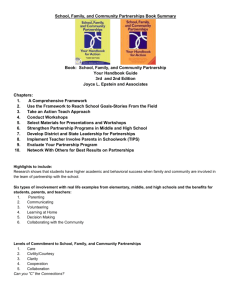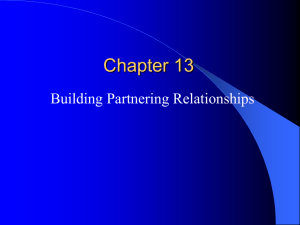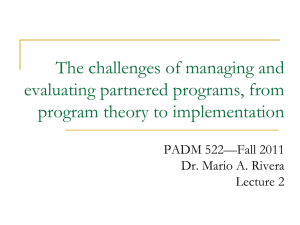DEPARTMENT: Educational Studies, Leadership and Counseling
advertisement
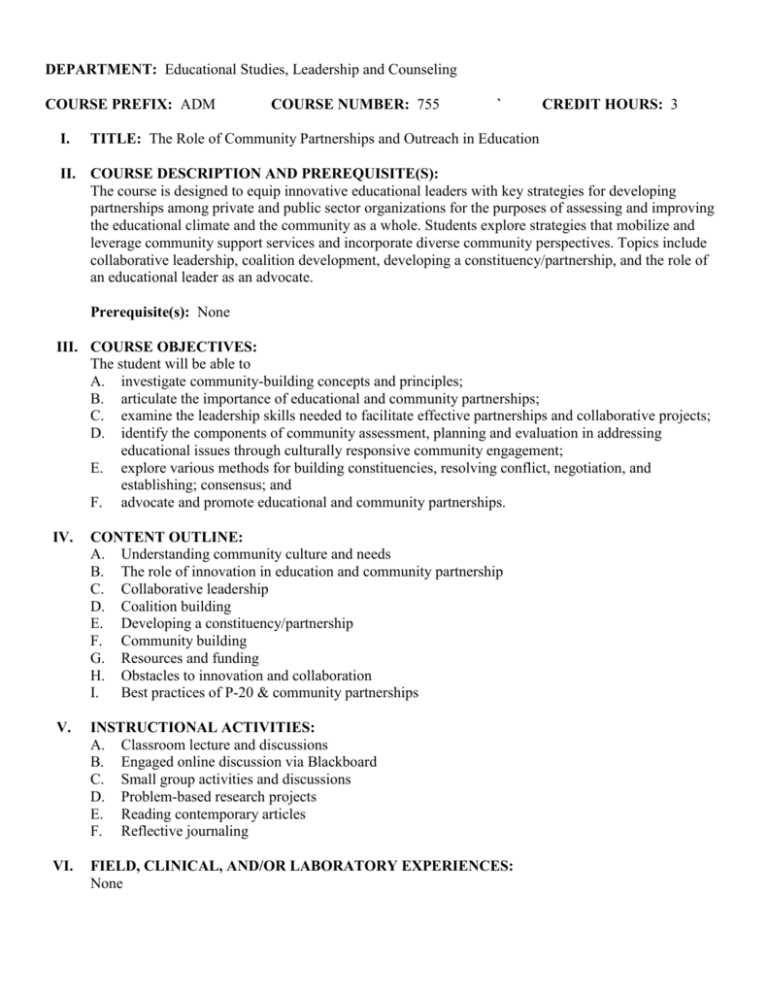
DEPARTMENT: Educational Studies, Leadership and Counseling COURSE PREFIX: ADM I. COURSE NUMBER: 755 ` CREDIT HOURS: 3 TITLE: The Role of Community Partnerships and Outreach in Education II. COURSE DESCRIPTION AND PREREQUISITE(S): The course is designed to equip innovative educational leaders with key strategies for developing partnerships among private and public sector organizations for the purposes of assessing and improving the educational climate and the community as a whole. Students explore strategies that mobilize and leverage community support services and incorporate diverse community perspectives. Topics include collaborative leadership, coalition development, developing a constituency/partnership, and the role of an educational leader as an advocate. Prerequisite(s): None III. COURSE OBJECTIVES: The student will be able to A. investigate community-building concepts and principles; B. articulate the importance of educational and community partnerships; C. examine the leadership skills needed to facilitate effective partnerships and collaborative projects; D. identify the components of community assessment, planning and evaluation in addressing educational issues through culturally responsive community engagement; E. explore various methods for building constituencies, resolving conflict, negotiation, and establishing; consensus; and F. advocate and promote educational and community partnerships. IV. CONTENT OUTLINE: A. Understanding community culture and needs B. The role of innovation in education and community partnership C. Collaborative leadership D. Coalition building E. Developing a constituency/partnership F. Community building G. Resources and funding H. Obstacles to innovation and collaboration I. Best practices of P-20 & community partnerships V. INSTRUCTIONAL ACTIVITIES: A. Classroom lecture and discussions B. Engaged online discussion via Blackboard C. Small group activities and discussions D. Problem-based research projects E. Reading contemporary articles F. Reflective journaling VI. FIELD, CLINICAL, AND/OR LABORATORY EXPERIENCES: None VII. TEXT(S) AND RESOURCES: Rubin, H. (2009). Collaborative leadership: Developing effective partnerships for communities and schools (3rd ed.). Thousand Oaks, CA: Corwin. VIII. EVALUATION AND GRADING PROCEDURES: Evaluation and grade will be determined by assignments, tests, and projects based on text, supplementary readings in professional journals, lectures, presentations, group activities, and class discussions. Signature Assignment: Teams of students complete a consulting project with a school district or community partner within the Murray State University service region. The purpose of the project is to propose the design, implementation and evaluation of an educational/community partnership program. The proposal should reflect the needs of the organization and the community and provide strategies for the educational/community partnership. In addition, the proposal should include significant research linking the recommendations to the literature. IX. ATTENDANCE POLICY: Students are expected to adhere to the MSU Attendance Policy outlined in the current MSU Bulletin. X. ACADEMIC HONESTY POLICY: Murray State University takes seriously its moral and educational obligation to maintain high standards of academic honesty and ethical behavior. Instructors are expected to evaluate students’ academic achievements accurately, as well as ascertain that work submitted by students is authentic and the result of their own efforts, and consistent with established academic standards. Students are obligated to respect and abide by the basic standards of personal and professional integrity. Violations of Academic Honesty include: Cheating - Intentionally using or attempting to use unauthorized information such as books, notes, study aids, or other electronic, online, or digital devices in any academic exercise; as well as unauthorized communication of information by any means to or from others during any academic exercise. Fabrication and Falsification - Intentional alteration or invention of any information or citation in an academic exercise. Falsification involves changing information whereas fabrication involves inventing or counterfeiting information. Multiple Submission - The submission of substantial portions of the same academic work, including oral reports, for credit more than once without authorization from the instructor. Plagiarism - Intentionally or knowingly representing the words, ideas, creative work, or data of someone else as one’s own in any academic exercise, without due and proper acknowledgement. Instructors should outline their expectations that may go beyond the scope of this policy at the beginning of each course and identify such expectations and restrictions in the course syllabus. When an instructor receives evidence, either directly or indirectly, of academic dishonesty, he or she should investigate the instance. The faculty member should then take appropriate disciplinary action. Disciplinary action may include, but is not limited to the following: 1) Requiring the student(s) to repeat the exercise or do additional related exercise(s). 2) Lowering the grade or failing the student(s) on the particular exercise(s) involved. 3) Lowering the grade or failing the student(s) in the course. If the disciplinary action results in the awarding of a grade of E in the course, the student(s) may not drop the course. Faculty reserve the right to invalidate any exercise or other evaluative measures if substantial evidence exists that the integrity of the exercise has been compromised. Faculty also reserve the right to document in the course syllabi further academic honesty policy elements related to the individual disciplines. A student may appeal the decision of the faculty member with the department chair in writing within five working days. Note: If, at any point in this process, the student alleges that actions have taken place that may be in violation of the Murray State University Non-Discrimination Statement, this process must be suspended and the matter be directed to the Office of Equal Opportunity. Any appeal will be forwarded to the appropriate university committee as determined by the Provost. XI. NON-DISCRIMINATION POLICY STATEMENT: Murray State University endorses the intent of all federal and state laws created to prohibit discrimination. Murray State University does not discriminate on the basis of race, color, national origin, gender, sexual orientation, religion, age, veteran status, or disability in employment, admissions, or the provision of services and provides, upon request, reasonable accommodation including auxiliary aids and services necessary to afford individuals with disabilities equal access to participate in all programs and activities. For more information, contact the Director of Equal Opportunity, 103 Wells Hall, (270) 809-3155 (voice), (270) 809-3361 (TDD).
